| |
|
|

|
|
ATLAS |
|
|
Assistive
Technology
Laboratory
at
Stanford |
|
|
|
Technology
and design benefitting individuals with disabilities and older adults in the
local community |
February 22, 2019 |
|
|
|
|

Perspectives is the newsletter of the
Stanford course,
Perspectives in Assistive
Technology.
Designing Exoskeletons and
Prosthetic Limbs
that Enhance Human Performance
This
issue invites you to attend the next class
session.
|
Perspectives in Assistive Technology is a Winter
Quarter Stanford course - preparing for its thirteenth year - that
explores the design, development, and use of assistive technology that benefits
people with disabilities and older adults. It consists of semi-weekly classroom
discussions; lectures by notable professionals, clinicians, and
assistive technology users; tours of local medical, clinical, and
engineering facilities; student project presentations and demonstrations; an
Assistive Technology Faire; and a film screening. |
Next class session - Tuesday, February 26th at
4:30pm
|
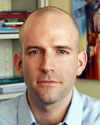
|
Designing Exoskeletons and
Prosthetic Limbs that Enhance Human Performance
Steven H. Collins, PhD
Stanford University - Mechanical Engineering
Department |
Abstract: "My central research goal is to develop
wearable robotic devices that improve mobility and quality of life, especially
for people with disabilities. My laboratory uses three complementary
approaches. First, we develop tools to speed and systematize the design of
prostheses and exoskeletons. Humans are complex, limiting the effectiveness of
typical robotics design methods, so we have developed a new approach that
utilizes versatile, laboratory-based emulator systems. Second, we leverage our
emulators in basic scientific experiments aimed at discovering and
characterizing new methods of assistance. Our versatile hardware allows rapid
implementation of new ideas, controlled characterization of human response to
device functionality, and new approaches to design and prescription involving
online adaptation and patient-specific device optimization. Finally, we
translate successful approaches into energy-efficient mobile devices. For
example, we recently demonstrated an ankle exoskeleton that uses no energy
itself yet reduces the metabolic energy cost of human walking. We are currently
developing actuators based on electrostatic adhesion that are both energy
efficient and controllable, which will enable new types of high-performance
wearable robots."
From his February 18, 2016 Stanford lecture,
Designing
robotic prostheses and exoskeletons that improve human mobility
Biosketch: Steven H. Collins is an
Associate Professor of Mechanical Engineering here at Stanford. Before he
arrived on campus he was at Carnegie Mellon University, where he directed the
Experimental Biomechatronics
Laboratory and taught courses on Robotics and Design. He received his BS
from Cornell University in 2002 and his PhD from the University of Michigan in
2008, and performed postdoctoral research at T.U. Delft. He has published in
Science and Nature. He was a member of the scientific board of the Dynamic
Walking 2013 Conference, the recipient of the American Society of Biomechanics
Post-Doctoral Young Investigator Award in 2013, an ICRA Best Medical Robotics
Paper winner in 2015, and was voted CMU Department of Mechanical Engineering
Professor of the Year.
|
You are invited to attend this and the
remaining class sessions - Class sessions are held on Tuesdays and
Thursdays from 4:30 to 5:50pm until
Thursday, March 14th and are open to the greater
Stanford community. You need not be a Stanford student to attend, no signup is
required, and there is no charge. |
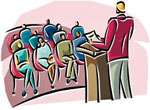 |
|
|
New classroom! - The course will
be held in classroom 282 in the
Lathrop
Library located at the corner of Lasuen Mall and Serra Mall, adjacent to
Memorial Auditorium and the Oval. It seats as many as 150 people in a flexible
and accessible space. Here is a webpage with maps, directions, and photos. |
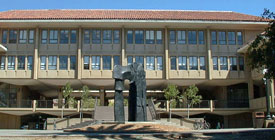 |
|
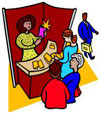
Attend the Assistive Technology
Faire - This seventh annual course event will provide an
opportunity for students and community members to get an up-close look at a
variety of assistive technology devices and learn about available services.
Users of assistive technology products as well as small companies
and agencies serving individuals with disabilities and older adults have
been encouraged to bring assistive technology devices and information to
display, demonstrate, and discuss. Everyone is welcome to attend the Faire -
rain or shine.
|
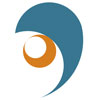
"Save the Date" for Stanford's
Inaugural Disability Studies Conference - Mediations: Disability, Technology,
and the Arts - This day-long conference will host research
presentations alongside workshops. In addition to academic panels and
discussions, the venue will be filled with artwork and exhibitions by the local
Stanford disability community. In the spirit of infrastructural and cultural
accessibility, Mediations:
Disability, Technology, and the Arts is open to public participation, and
presenters are encouraged to prepare to speak to both colleagues and
non-specialists. Conference participants should look forward to a unique
experience that brings together critical discussion and public
engagement.
| When: |
|
Saturday, May 18th - all day |
| Where: |
|
Campus location to be announced |
| Information: |
|
Registration fee to be
announced |
|
Other
Support the course -
Funding in any amount for the course and student projects is always welcomed.
Monetary gifts support approved project expenses, administrative costs,
honoraria for guest lecturers, and the end-of-term celebration. Refer to the
Course and Project Support
webpage for more information.
Email questions, comments, or
suggestions - Please email
me if you have general questions, comments, or suggestions regarding the
course. Thank you again for your interest.
Dave
|
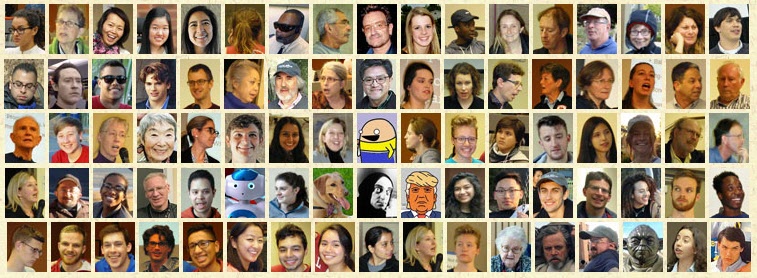
To unsubscribe from this newsletter, please email
Dave. |
|








